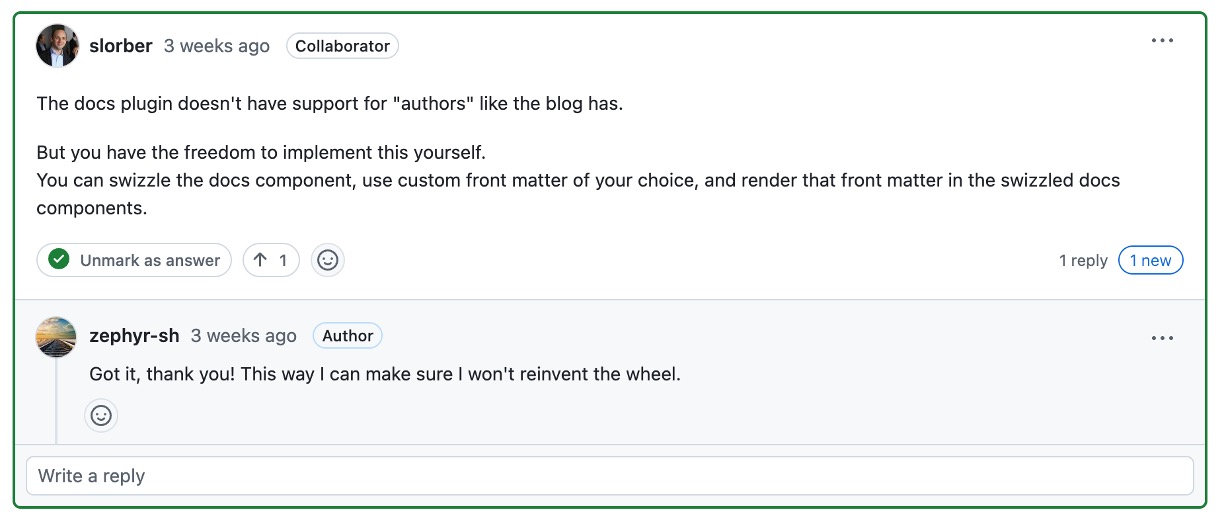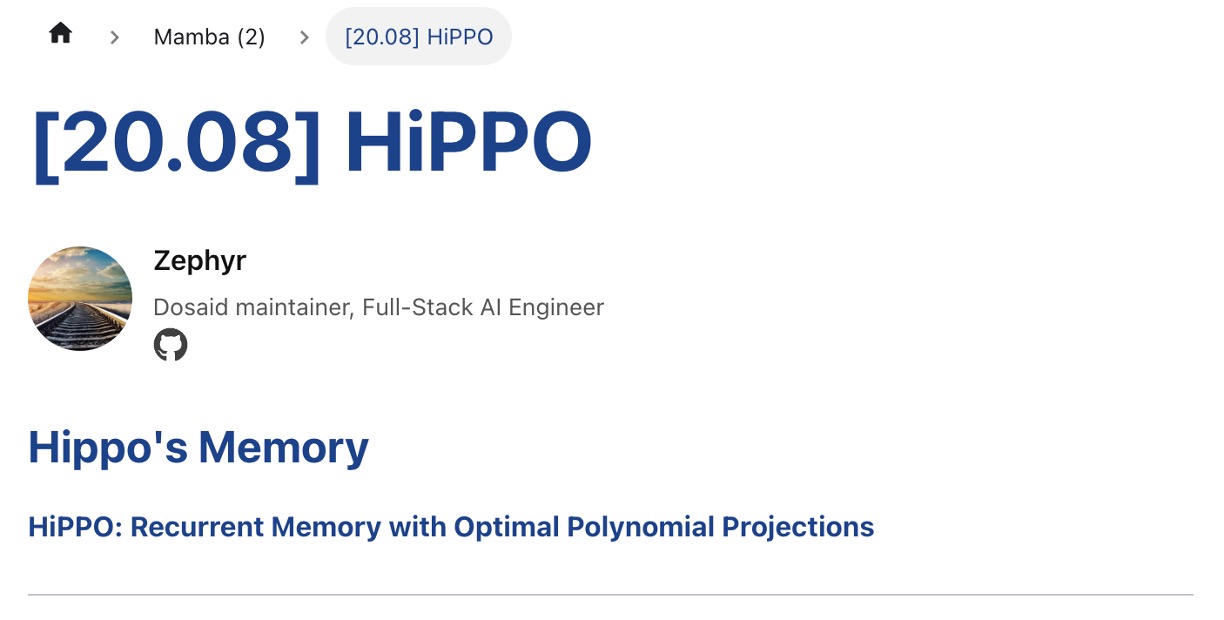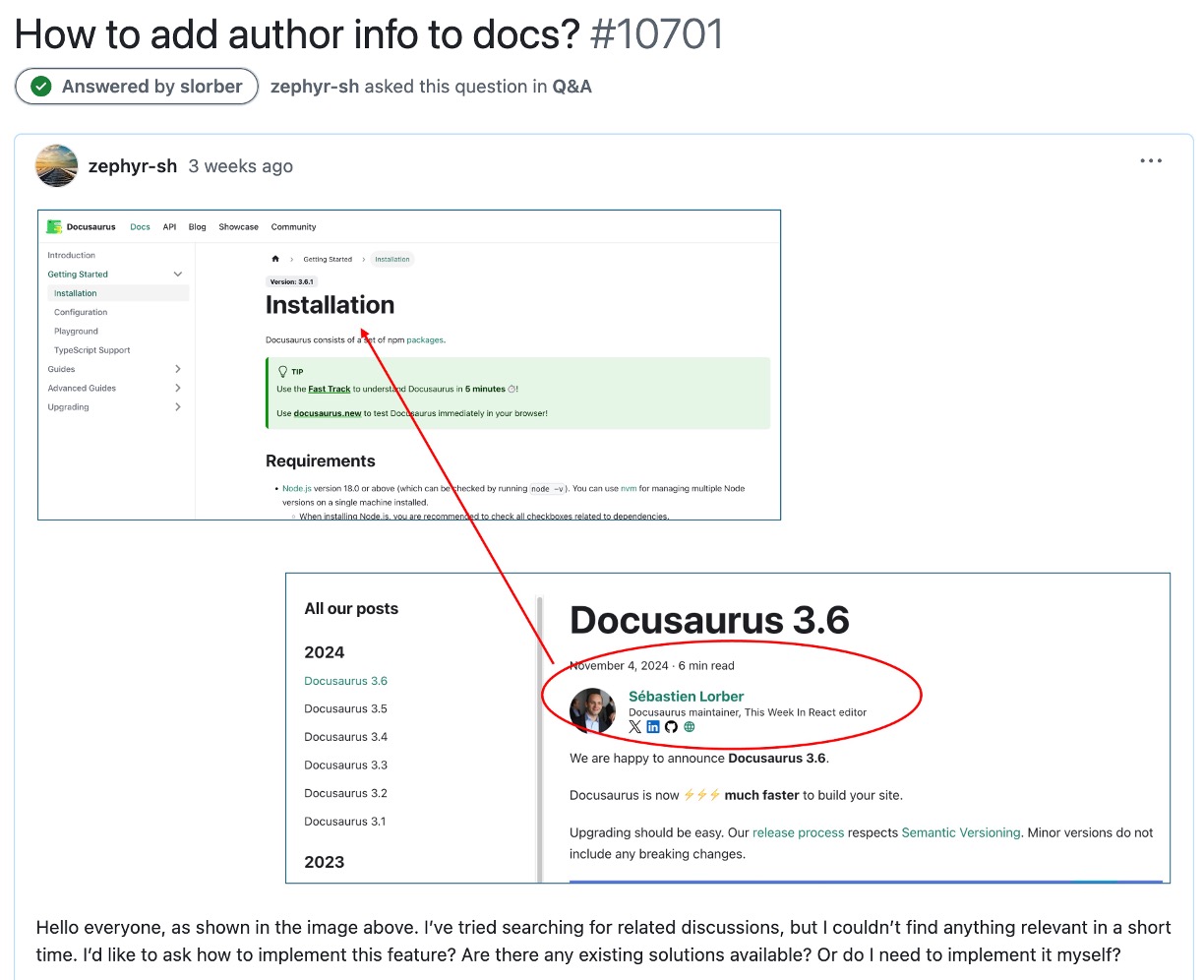If you're also using Docusaurus to write a website, then you must be aware that Docusaurus has two main content types:
- The plugin used for blogs is:
@docusaurus/plugin-content-blog - The part for technical documentation is:
@docusaurus/plugin-content-docs
Among them, only blog has author info functionality, while docs does not.
Oh no, what a shock!
First, Ask the Official Team
We first went to the Docusaurus GitHub to ask about this feature and see if the official team supports it.
Maybe the Docusaurus authors would show some mercy and help us add this feature.
But after waiting for a while, we got a reply from the official team:

In short, they tell you to figure it out yourself; the official team doesn’t support it.
It looks like it's better to rely on ourselves, so we had no choice but to forge ahead.
Add Author Info
In the original design, the author info is placed in the blog/authors.yml file, and the content looks something like this:
Z. Yuan:
name: Z. Yuan
title: Dosaid maintainer, Full-Stack AI Engineer
url: https://github.com/zephyr-sh
image_url: https://github.com/zephyr-sh.png
socials:
github: "zephyr-sh"
We first create a new file blog/authors.json in the same path and rewrite the same content into JSON format:
{
"Z. Yuan": {
"name": "Z. Yuan",
"title": "Dosaid maintainer, Full-Stack AI Engineer",
"url": "https://github.com/zephyr-sh",
"image_url": "https://github.com/zephyr-sh.png",
"socials": {
"github": "zephyr-sh"
}
}
}
During development, we found that parsing YML files was cumbersome, and after some testing, we decided that using JSON format is the easiest.
Although this file is meant for docs, we still place it in the blog folder so that we remember to update it when making changes.
Extract DocItem/Content
From this step onward, we need to modify the Docusaurus source code.
If there are future breaking updates to Docusaurus, this modification may cause the website to malfunction. Make sure you have the ability to maintain the website before proceeding.
First, we extract the DocItemContent code. Please run the following command:
npx docusaurus swizzle @docusaurus/theme-classic DocItem/Content
After running the command, you will encounter a few questions:
-
Which language do you want to use?
We select
JavaScript. -
Which swizzle action do you want to do?
We select
Eject. -
Do you really want to swizzle this unsafe internal component?
We select
YES: I know what I am doing!.
Now, you can find a path: src/theme/DocItem/Content, where there is an index.js file. This is where we need to make changes.
- The original code for this program is here: docusaurus-theme-classic/src/theme/DocItem/Content
The modified code is as follows:
import { useDoc } from "@docusaurus/plugin-content-docs/client";
import { ThemeClassNames } from "@docusaurus/theme-common";
import DocItemAuthors from "@theme/DocItem/Authors";
import Heading from "@theme/Heading";
import MDXContent from "@theme/MDXContent";
import clsx from "clsx";
import React from "react";
function useSyntheticTitle() {
const { metadata, frontMatter, contentTitle } = useDoc();
const shouldRender =
!frontMatter.hide_title && typeof contentTitle === "undefined";
if (!shouldRender) {
return null;
}
return metadata.title;
}
export default function DocItemContent({ children }) {
const syntheticTitle = useSyntheticTitle();
return (
<div className={clsx(ThemeClassNames.docs.docMarkdown, "markdown")}>
{syntheticTitle ? (
<header>
<Heading as="h1">{syntheticTitle}</Heading>
<DocItemAuthors />
<MDXContent>{children}</MDXContent>
</header>
) : (
<>
<DocItemAuthors />
<MDXContent>{children}</MDXContent>
</>
)}
</div>
);
}
The key addition is a new module:
import DocItemAuthors from "@theme/DocItem/Authors";
This part will be implemented later.
Implement DocItem/Authors
Now, let's implement the Authors component. Please run the following commands:
mkdir -p src/theme/DocItem/Authors
touch src/theme/DocItem/Authors/index.js
touch src/theme/DocItem/Authors/styles.module.css
For this part, we refer to the Authors component in Blog and replicate it.
The code for DocItem/Authors/index.js is as follows:
import { useDoc } from "@docusaurus/plugin-content-docs/client";
import authorsData from "@site/blog/authors.json";
import React from "react";
import {
FaEnvelope,
FaGithub,
FaLinkedin,
FaRss,
FaStackOverflow,
FaTwitter,
} from "react-icons/fa";
import styles from "./index.module.css";
function normalizeSocialLink(platform, handleOrUrl) {
const isAbsoluteUrl =
handleOrUrl.startsWith("http://") || handleOrUrl.startsWith("https://");
if (isAbsoluteUrl) {
return handleOrUrl;
}
switch (platform) {
case "x":
return `https://x.com/${handleOrUrl}`;
case "github":
return `https://github.com/${handleOrUrl}`;
case "linkedin":
return `https://www.linkedin.com/in/${handleOrUrl}/`;
case "stackoverflow":
return `https://stackoverflow.com/users/${handleOrUrl}`;
case "newsletter":
return handleOrUrl;
case "email":
return `mailto:${handleOrUrl}`;
default:
return handleOrUrl;
}
}
const socialIconMap = {
x: FaTwitter,
github: FaGithub,
linkedin: FaLinkedin,
stackoverflow: FaStackOverflow,
email: FaEnvelope,
newsletter: FaRss,
};
export default function DocItemAuthors() {
const { frontMatter } = useDoc();
let { authors } = frontMatter;
if (!authors) {
return null;
}
if (typeof authors === "string") {
authors = [authors];
}
const resolvedAuthors = authors
.map((authorKeyOrObj) => {
if (typeof authorKeyOrObj === "string") {
const authorInfo = authorsData[authorKeyOrObj];
if (!authorInfo) {
console.warn(
`No author data found for key '${authorKeyOrObj}' in authors.json`
);
return null;
}
return {
name: authorInfo.name,
title: authorInfo.title,
url: authorInfo.url,
imageURL: authorInfo.image_url,
socials: authorInfo.socials,
description: authorInfo.description,
};
} else {
const { name, title, url, image_url, imageURL, socials, description } =
authorKeyOrObj;
return {
name,
title,
url,
imageURL: imageURL || image_url,
socials,
description,
};
}
})
.filter(Boolean);
if (resolvedAuthors.length === 0) {
return null;
}
return (
<div className={`${styles.docAuthors} margin-bottom--md`}>
{resolvedAuthors.map((author, index) => {
const { name, title, url, imageURL, socials, description } = author;
return (
<div key={index} className={styles.docAuthor}>
{imageURL && (
<img src={imageURL} alt={name} className={styles.docAuthorImg} />
)}
<div>
<div className={styles.docAuthorName}>
{url ? (
<a href={url} target="_blank" rel="noopener noreferrer">
{name}
</a>
) : (
name
)}
</div>
{title && <div className={styles.docAuthorTitle}>{title}</div>}
{description && (
<div className={styles.docAuthorDesc}>{description}</div>
)}
{socials && (
<div className={styles.docAuthorSocials}>
{Object.entries(socials).map(([platform, handleOrUrl]) => {
const SocialIcon = socialIconMap[platform] || FaEnvelope;
const normalizedUrl = normalizeSocialLink(
platform,
handleOrUrl
);
return (
<a
key={platform}
href={normalizedUrl}
target="_blank"
rel="noopener noreferrer"
className={styles.docAuthorSocialLink}
>
<SocialIcon size={20} />
</a>
);
})}
</div>
)}
</div>
</div>
);
})}
</div>
);
}
Here, we're using react-icons. If you haven't installed it yet, please run the following command:
yarn add react-icons
Please note that some parts are hardcoded here, for example:
function normalizeSocialLink(platform, handleOrUrl) {
const isAbsoluteUrl =
handleOrUrl.startsWith("http://") || handleOrUrl.startsWith("https://");
if (isAbsoluteUrl) {
return handleOrUrl;
}
switch (platform) {
case "x":
return `https://x.com/${handleOrUrl}`;
case "github":
return `https://github.com/${handleOrUrl}`;
case "linkedin":
return `https://www.linkedin.com/in/${handleOrUrl}/`;
case "stackoverflow":
return `https://stackoverflow.com/users/${handleOrUrl}`;
case "newsletter":
return handleOrUrl;
case "email":
return `mailto:${handleOrUrl}`;
default:
return handleOrUrl;
}
}
const socialIconMap = {
x: FaTwitter,
github: FaGithub,
linkedin: FaLinkedin,
stackoverflow: FaStackOverflow,
email: FaEnvelope,
newsletter: FaRss,
};
If the URLs change, you may need to modify these areas.
Finally, here is the code for DocItem/Authors/styles.module.css:
.docAuthor {
display: flex;
align-items: center;
margin-bottom: 2rem;
}
.docAuthorImg {
width: 60px;
height: 60px;
border-radius: 50%;
margin-right: 0.75rem;
object-fit: cover;
}
.docAuthorName {
font-weight: 600;
font-size: 1rem;
margin-bottom: 0.25rem;
color: #111;
}
.docAuthorName a {
text-decoration: none;
color: inherit;
}
.docAuthorName a:hover {
text-decoration: underline;
}
.docAuthorTitle {
font-size: 0.85rem;
color: #555;
margin-bottom: 0.25rem;
line-height: 1.2;
}
.docAuthorDesc {
font-size: 0.85rem;
color: #333;
margin-bottom: 0.4rem;
line-height: 1.4;
}
.docAuthorSocials {
display: flex;
gap: 0.5rem;
flex-wrap: wrap;
align-items: center;
}
.docAuthorSocialLink {
display: inline-flex;
align-items: center;
text-decoration: none;
color: inherit;
line-height: 1;
}
.docAuthorSocialLink:hover {
color: var(--ifm-color-primary);
}
The implementation approach here depends on personal style. After testing several times, this design looks quite good.
You can modify these styles according to your own needs.
Adjust the FrontMatter of the Document
Finally, in order to display the author info in the docs files, we need to add the author's information to the FrontMatter of the document.
For example, in our website article: [20.08] HiPPO: Hippo's Memory
The original article looked like this:
# [20.08] HiPPO
## Hippo's Memory
[**HiPPO: Recurrent Memory with Optimal Polynomial Projections**](https://arxiv.org/abs/2008.07669)
Now, in order to include author information, we cannot use # for the title; instead, we need to define the title using FrontMatter.
So we modify it to:
---
title: "[20.08] HiPPO"
authors: Z. Yuan
---
## Hippo's Memory
[**HiPPO: Recurrent Memory with Optimal Polynomial Projections**](https://arxiv.org/abs/2008.07669)
In the authors field, specify the author's name so that the author information will be displayed.
Make sure that the name in authors matches the name in authors.json, otherwise, the author information will not be shown.
Implementation Complete
Finally, let's take a look at the effect on the website:

As shown in the image above, we have successfully added author information to the docs files. Cheers!
This concludes our implementation process. We hope it is helpful to you. Your support keeps my AI & full-stack guides coming. From idea to launch—efficient systems that are future-ready. Need a tech partner or custom solution? Let's connect.☕ Fuel my writing with a coffee
AI / Full-Stack / Custom — All In
All-In Bundle
🚀 Ready for your next project?


